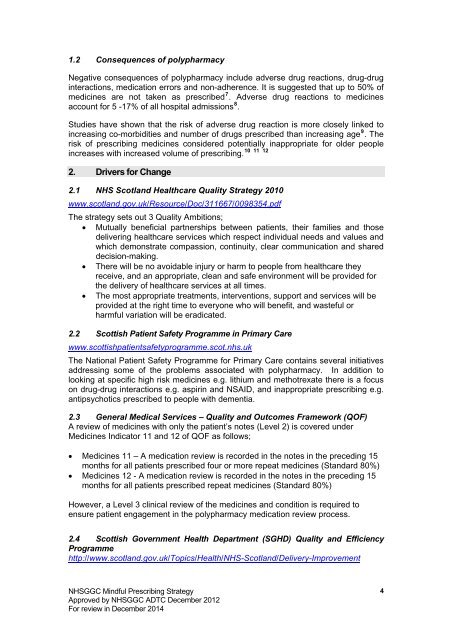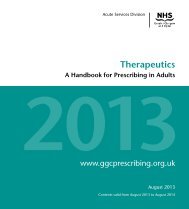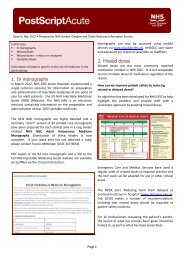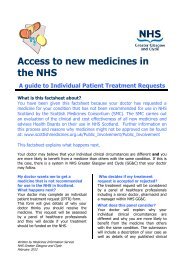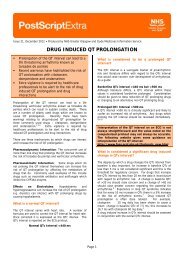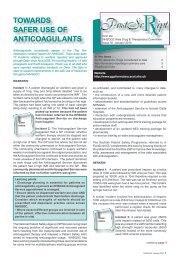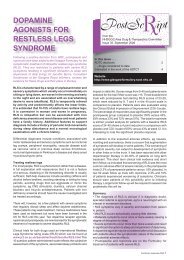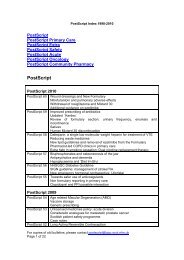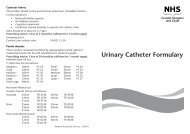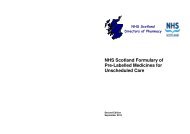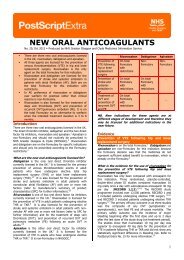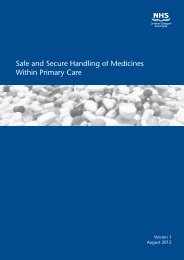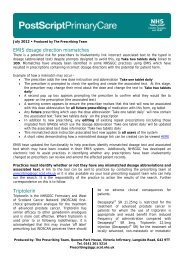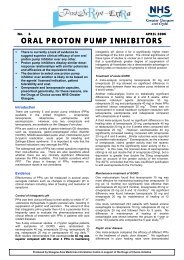NHS GG&C Polypharmacy Strategy - GGC Prescribing
NHS GG&C Polypharmacy Strategy - GGC Prescribing
NHS GG&C Polypharmacy Strategy - GGC Prescribing
Create successful ePaper yourself
Turn your PDF publications into a flip-book with our unique Google optimized e-Paper software.
1.2 Consequences of polypharmacyNegative consequences of polypharmacy include adverse drug reactions, drug-druginteractions, medication errors and non-adherence. It is suggested that up to 50% ofmedicines are not taken as prescribed 7 . Adverse drug reactions to medicinesaccount for 5 -17% of all hospital admissions 8 .Studies have shown that the risk of adverse drug reaction is more closely linked toincreasing co-morbidities and number of drugs prescribed than increasing age 9 . Therisk of prescribing medicines considered potentially inappropriate for older people10 11 12increases with increased volume of prescribing.2. Drivers for Change2.1 <strong>NHS</strong> Scotland Healthcare Quality <strong>Strategy</strong> 2010www.scotland.gov.uk/Resource/Doc/311667/0098354.pdfThe strategy sets out 3 Quality Ambitions; Mutually beneficial partnerships between patients, their families and thosedelivering healthcare services which respect individual needs and values andwhich demonstrate compassion, continuity, clear communication and shareddecision-making. There will be no avoidable injury or harm to people from healthcare theyreceive, and an appropriate, clean and safe environment will be provided forthe delivery of healthcare services at all times. The most appropriate treatments, interventions, support and services will beprovided at the right time to everyone who will benefit, and wasteful orharmful variation will be eradicated.2.2 Scottish Patient Safety Programme in Primary Carewww.scottishpatientsafetyprogramme.scot.nhs.ukThe National Patient Safety Programme for Primary Care contains several initiativesaddressing some of the problems associated with polypharmacy. In addition tolooking at specific high risk medicines e.g. lithium and methotrexate there is a focuson drug-drug interactions e.g. aspirin and NSAID, and inappropriate prescribing e.g.antipsychotics prescribed to people with dementia.2.3 General Medical Services – Quality and Outcomes Framework (QOF)A review of medicines with only the patient’s notes (Level 2) is covered underMedicines Indicator 11 and 12 of QOF as follows; Medicines 11 – A medication review is recorded in the notes in the preceding 15months for all patients prescribed four or more repeat medicines (Standard 80%) Medicines 12 - A medication review is recorded in the notes in the preceding 15months for all patients prescribed repeat medicines (Standard 80%)However, a Level 3 clinical review of the medicines and condition is required toensure patient engagement in the polypharmacy medication review process.2.4 Scottish Government Health Department (SGHD) Quality and EfficiencyProgrammehttp://www.scotland.gov.uk/Topics/Health/<strong>NHS</strong>-Scotland/Delivery-Improvement<strong>NHS</strong><strong>GGC</strong> Mindful <strong>Prescribing</strong> <strong>Strategy</strong>Approved by <strong>NHS</strong><strong>GGC</strong> ADTC December 2012For review in December 20144


